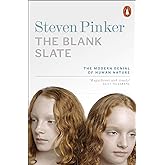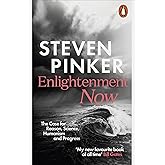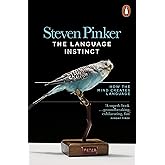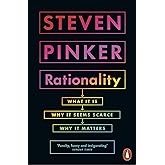
Download the free Kindle app and start reading Kindle books instantly on your smartphone, tablet or computer—no Kindle device required.
Read instantly on your browser with Kindle for Web.
Using your mobile phone camera, scan the code below and download the Kindle app.



 Audible sample
Audible sample The Sense of Style: The Thinking Person's Guide to Writing in the 21st Century Paperback – 21 October 2015
Purchase options and add-ons
Bad writing can't be blamed on the Internet, or on 'the kids today'. Good writing has always been hard- a performance requiring pretense, empathy, and a drive for coherence. In The Sense of Style, cognitive scientist and linguist Steven Pinker uses the latest scientific insights to bring us a style and usage guide for the 21st century. Can we distinguish the myths about language from rules that enhance clarity and grace? As Pinker shows, everyone can improve their mastery of writing and their appreciation of the art (yes, 'their').
- Print length368 pages
- LanguageEnglish
- PublisherPenguin Press
- Publication date21 October 2015
- Dimensions19.7 x 12.9 x 2.21 cm
- ISBN-109780241957714
- ISBN-13978-0241957714
Frequently bought together

Popular titles by this author
Product description
About the Author
Product details
- ASIN : 0241957710
- Publisher : Penguin Press; 1st edition (21 October 2015)
- Language : English
- Paperback : 368 pages
- ISBN-10 : 9780241957714
- ISBN-13 : 978-0241957714
- Dimensions : 19.7 x 12.9 x 2.21 cm
- Best Sellers Rank: 63,760 in Books (See Top 100 in Books)
- Customer Reviews:
About the author

Steven Pinker is one of the world's leading authorities on language and the mind. His popular and highly praised books include The Stuff of Thought, The Blank Slate, Words and Rules, How the Mind Works, and The Language Instinct. The recipient of several major awards for his teaching, books, and scientific research, Pinker is Harvard College Professor and Johnstone Family Professor of Psychology at Harvard University. He also writes frequently for The New York Times, Time, The New Republic, and other magazines.
Customer reviews
Top reviews from Australia
There was a problem filtering reviews. Please reload the page.
- Reviewed in Australia on 3 November 2023Verified PurchaseI have several grammar books stretching from the '70s to present time, and one thing I noticed is that academics love complicating things. Luckily, one of the top academics wrote this books and brought things back to its basics, including how to sort out English and American punctuation and what actually works and makes sense. A badly needed book and always at hand in my academic functions.
- Reviewed in Australia on 2 October 2023Verified PurchaseThere are some very entertaining examples of different writing styles but if everyone followed Pinker's advice the English language would become very mundane and staid.
- Reviewed in Australia on 31 May 2020I can't recommend this book enough. This book gave me new rules to follow and cleared my misconceptions by giving solid evidence.
It tells you
* How to make a paragraph be coherent
- when your sentences *should* use passive voice
- keep the topic as the subject of a sentence
- switch topics by using the next topic as the object of the linking sentence
* Write about things people could visualise by default
* When to use a nominalization ("The governor canceled the convention today. The cancellation...")
* How to order other information within a sentence to make it more understandable
http://www.openculture.com/2019/03/steven-pinkers-13-rules-for-good-writing.html
You should read this book while you're a few drafts deep in writing something. Read a bit of Steven's book; check your work against his advice; fix your errors.
- Reviewed in Australia on 17 October 2021What I WANTED was a book about writing that was loaded with actual examples of how writing can be improved.
What I GOT was …. Exactly that.
Happy to have found this book.
- Reviewed in Australia on 31 October 2018Verified PurchaseThis is a very readable style guide until the last chapter.
Pinker has done an excellent job of creating a readable persuasive style guide to the English language. He argues against some out-dated writing advice. I think this will be the reference to judge style guides against.
However, I found the final chapter to be confusing. This contrasted strongly with the preceding chapters. I could have been overwhelmed by the quantity and advice given. Whatever the reason, I lost my way and came away disappointed.
- Reviewed in Australia on 21 October 2014Verified PurchaseThis is well written, clear, and makes good sense. It is also interesting to read the author's thoughts as he interprets a variety of prose. I'm just not sure we needed another grammar book; not enough here is fresh.
Top reviews from other countries
 TimReviewed in Japan on 12 April 2020
TimReviewed in Japan on 12 April 20205.0 out of 5 stars For aspiring writers and readers interested in writing style.
Verified PurchaseFor anyone looking to improve her scribbling style, or just interested in remembering what makes good writing good, this book is a fascinating and informative read.
Initially drawn to Mr Pinker after reading a very different book-Enlightenment Now!-I found myself intrigued by one that takes us more specifically into his areas of expertise. Having made his name in the study of cognitive psycholinguistics, it is only natural that Steven Pinker should give us a book devoted-as were our old style manuals from our uni days-to showing the reader how to employ tried-and-true writing techniques, as well as encouraging us, as we write, to challenge some of the old conventions of writing style and structure.
Mr Pinker provides numerous examples of writing, from the very bad to the exceptional, and illustrates how to avoid the usual traps of wordiness and sloppy style.
A worthwhile primer or a reminder, wherever you may be in your writing stages.
 amazon4rkbReviewed in India on 5 April 2022
amazon4rkbReviewed in India on 5 April 20225.0 out of 5 stars A fine contemporary style guide
Verified PurchaseA fine contemporary style guide
There are books which the blurb on the back cover calls 'unputdownable'. Then there are books to be worked at. This is one of those. If you want a relaxed read through the elements of classic writing style, this is not for you.
However Steven Pinker's work is delightful in a different way. It goes beyond the borders of grammar; and the play of words, the turn of phrase and the subtle humour make the plough worth it.
The best parts are where he analyzes the debatable issues and shows you how different senses of a word/phrase make certain exceptions possible ('very unique' is acceptable in certain cases, 𝘦.𝘨.).
Pick it up when you have plenty of days at hand for it's not a work to be finished in one sitting.
But yes, the dividends are rich, once you go through it. You get clarity on a number of doubts (you were afraid to ask).
After I got it for my Kindle ereader, I ordered a hard copy as well as I realized its worth as a reference manual.
📚📖📓
 A fine contemporary style guide5.0 out of 5 stars
A fine contemporary style guide5.0 out of 5 stars amazon4rkb
amazon4rkbA fine contemporary style guide
Reviewed in India on 5 April 2022
There are books which the blurb on the back cover calls 'unputdownable'. Then there are books to be worked at. This is one of those. If you want a relaxed read through the elements of classic writing style, this is not for you.
However Steven Pinker's work is delightful in a different way. It goes beyond the borders of grammar; and the play of words, the turn of phrase and the subtle humour make the plough worth it.
The best parts are where he analyzes the debatable issues and shows you how different senses of a word/phrase make certain exceptions possible ('very unique' is acceptable in certain cases, 𝘦.𝘨.).
Pick it up when you have plenty of days at hand for it's not a work to be finished in one sitting.
But yes, the dividends are rich, once you go through it. You get clarity on a number of doubts (you were afraid to ask).
After I got it for my Kindle ereader, I ordered a hard copy as well as I realized its worth as a reference manual.
📚📖📓
Images in this review
-
 Gianni Da Re LombardiReviewed in Italy on 10 October 2023
Gianni Da Re LombardiReviewed in Italy on 10 October 20235.0 out of 5 stars Lettura interessante per chi scrive professionalmente
Verified PurchaseAlcuni capitoli sono troppo tecnici per il lettore comune, ovvero il non specialista in linguistica.
Offre comunque interessanti e utili approfondimenti per chi scrive di professione, si tratti di un giornalista, uno scrittore o un lavoratore intellettuale che ogni tanto produce documenti scritti che abbiano l'obiettivo di farsi comprendere.
 Ed BattistellaReviewed in the United States on 27 November 2014
Ed BattistellaReviewed in the United States on 27 November 20145.0 out of 5 stars A style guide by someone who cares
Verified PurchaseSteven Pinker’s <I>The Sense of Style</I> fits into the tradition of style guides that began with Fowler and continues up through Bryan Garner. It will inevitably be compared with Willard Stunk and E. B. White’s <I>Elements of Style</I>, that sputnik-era Seussification of grammar and style. But the real comparison is with Joseph Williams’s excellent, but somewhat dated, book <I>Style: Towards Clarity and Grace</I>, one of the first works to blend linguistics and style. Pinker adopts and updates some of Williams’s insights (with all due acknowledgment of course) and connect them even more closely to current research in psycholinguistics and grammar.
Chapters 1-3 warm the reader up, with Pinker’s characteristic charm and good humor. In Chapter 1, “Good Writing,” Pinker reverse engineers (as he puts it) several examples of clear exposition, showing the value of simply thinking through what works in writing—strong starts, fresh idioms and diction, occasional playfulness, use of rhythm and meter, attention to the reader’s vantage point.
Chapter 2, “A Window on the World,” bring in the work of Francis-Noël Thomas and Mark Turner (in their book <I>Clear and Simple as the Truth</I>) which defines “the classic style.” That is the style which draws its strength from the writer’s helping the reader see the world in a new way. Strong writers show the informed reader with narrative, explanation and examples that meet the readers where they are. That is opposed of course to the academic (and especially post-modern style) and Pinker finds no dearth of examples to illustrate the difference.
In Chapter 3, “The Curse of Knowledge,” Pinker explains the problem of specialists who are unable to see the world as their readers see it and thus over-complicate their prose with jargon, nominalizations, abbreviations, unexplained assumptions, and other insider shortcuts.
Chapter 4 “The Web, The Tree, and the String” is a long chapter (really, it’s pages 76-138) on syntax. Pinker’s basic point here is that syntax is our tool for putting organization to thought and, moreover, that thinking about sentences as structured entities (modelled by tree diagrams) rather than simple flat strings of words can give us a richer outlook on many problems of style. It’s a fine chapter for linguists, but general readers may struggle a bit here. As more than one readers has noted, here Pinker himself seems to fall victim to the curse of knowledge.
Chapter 5 “Arcs of Coherence” is another long chapter (pages 139-186) in which Pinker shows how writers build (or don’t build) coherence in sentences and paragraphs. Coherence involves carefully attending to the reader’s knowledge and to the pattern a writer develops through parallelism, consistency of diction, integration new ideas into ones just introduced, and continual focus on the point of the prose.
Chapter 6, “Telling Right from Wrong,” is not so much a chapter as a separate style guide making up about a third of the book. Here Pinker gleefully takes on many the traditional rules and folk rules of English grammar, separating them into broad categories of grammar; quantity, quality and degree; diction; and punctuation. He explains, refines or corrects the traditional takes on grammar, doing so in a way will warm the heart of anyway who has ever been scolded by an ignoramus and capture the interest of the open-minded. Don’t skip the style guide; it’s got some gems on <I>fewer</I> vs. <I>less</i>, restrictive and non-restrictive, fused participles, and the use of commas.
<I>The Sense of Style</I> has a few flaws (the curse of knowledge, for one) and it might have been shorter in chapters 4 and 5. But overall it is a fine book, well written and well thought out, by someone who not only cares about language but cares about the facts.















